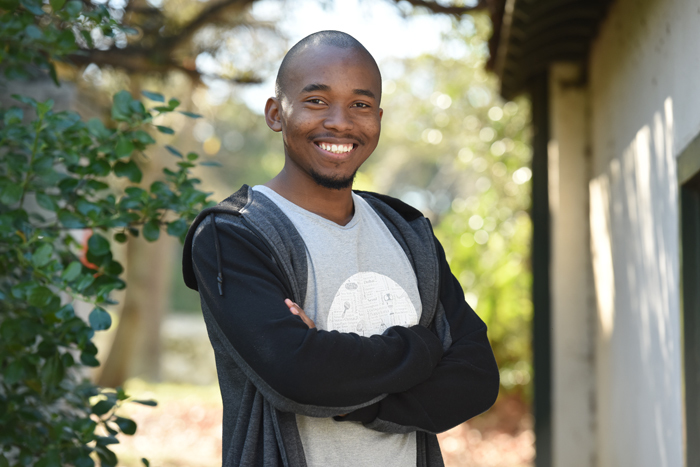MasterCard Foundation scholar wants to develop Lesotho
16 September 2016 | Story by Newsroom
Thato Semoko, from Maputsoe, Lesotho, has always had an interest in creating things – it's what informed his choice to study electrical and computer engineering at UCT.
Thato performed well at school academically and went on to complete his A-levels at Machabeng College – International School of Lesotho after he matriculated.
“When you have been introduced to education, you realise there should be something more done in society,” he says.
He has always been keen to further his studies and, after graduating from Machabeng, he applied at UCT for electrical and computer engineering.
“My eyes were set on studying in South Africa because back home we don't have any engineering programmes. My dream was to get the degree from a really good university,” he says.
He came across the MasterCard Foundation Scholarship Programme after a friend recommended that he apply. So he googled to find out as much about the programme as he could and then emailed the foundation for more information.
He found the essay section of the application particularly challenging.
“I couldn't beat around the bush – I only had 500 words to sell myself and my project, but I managed. It was a good experience,” he chuckles.
But he still wasn't confident with his application and was surprised when he received the congratulatory email to say that he had received the scholarship.
“I was really happy I got that email, because at that time I was struggling to even get decent scanning machines.” he says.
'It's a comprehensive scholarship'
Thato enjoys the fact that the scholarship allows scholars to focus on their studies. He says that he has never had to worry about money for stationery, excursions or extramural activities.
“It's you just focusing on your studies and trying to learn more about society so you can go back home and apply what you've learnt here and improve your community,” he says.
And he enjoys the exposure the scholarship has given him.
“We have mentors and they invite people from the corporate world to come engage with us and it's very transforming,” he explains.
“I feel like I was ignorant about so many things when I first came here. I was in my own space, and the programme has really helped me because it's diverse with students from all over Africa.”
At first he had difficulty with interacting with the different students, but he appreciates the personal development that the experience has afforded him.
“I was being exposed to so many different cultures, but gradually you develop that open mindedness which you definitely need in a diverse community,” he says.
Baobab Summit
This year he was one of the scholars selected to travel to the Baobab Summit in Ghana. The MasterCard Foundation scholarship holds the summit annually, allowing representatives from the different universities to come together for a week.
“We met people who work with the foundation. We had an opportunity to chat to them about our visions and projects after our presentations,” he says. “They were very supportive and it was lovely to network and have access to resources to assist us with starting our projects.”
One of his highlights was chatting to other scholars about their projects and ideas. Another high point was a presentation by Bernice Depaah, a Ghanaian entrepreneur who designs bicycles with bamboo.
“It's made a lot of change in her community and saved a lot of resources. And it's green, so that was inspiring. It's inspiring when people use what they have learnt to develop others,” he says.
'There's more that I can give'
Thato is currently in second year and hopes to graduate in 2018. Although he is still trying to map out his interests, he has a keen interest in telecommunications.
“I'd like to develop native networks in the country [Lesotho] because we don't have our own – we use MTN, Vodacom and Econet. That was my vision when I first started,” he explains. “But now education is also an interest of mine; I want to start with a community library in my home town.”
His passion comes from realising that the youth in Lesotho are not motivated to pursue their studies after matric.
“Many have seen others go to varsity in the country and not succeed, so they don't want to take that chance and be embarrassed,” he says. “It's not that they don't have the talent or work ethic – they go to work in factories at a very young age and survive on small salaries. So, for me, I see them as very strong people.”
His hope is that with the knowledge they get from the small library, the younger people will gradually develop a more inquisitive culture. In turn, he believes that this will lead them to put into practice what they have learned and help their communities.
“We tend to wait for other people for help, especially from people outside the country, but there is so much more we can offer ourselves,” he elaborates.
“But I feel like we will get there one day.”
Story Chido Mbambe. Photo Michael Hammond.
 This work is licensed under a Creative Commons Attribution-NoDerivatives 4.0 International License.
This work is licensed under a Creative Commons Attribution-NoDerivatives 4.0 International License.
Please view the republishing articles page for more information.










